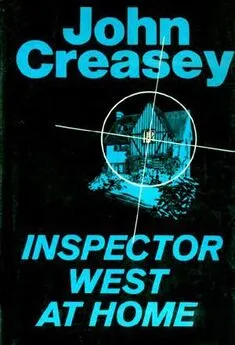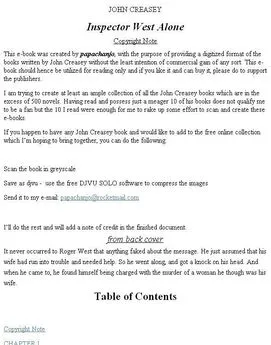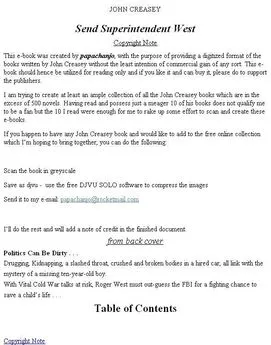John Creasey - Inspector West At Home
- Название:Inspector West At Home
- Автор:
- Жанр:
- Издательство:неизвестно
- Год:неизвестен
- ISBN:нет данных
- Рейтинг:
- Избранное:Добавить в избранное
-
Отзывы:
-
Ваша оценка:
John Creasey - Inspector West At Home краткое содержание
Inspector West At Home - читать онлайн бесплатно полную версию (весь текст целиком)
Интервал:
Закладка:
“How can my wife help you?” he inquired.
“Her enthusiasm and organising ability are so well known,” said Mrs Sylvester Cartier. “I have been told that she is quite exceptional. You know of our Charity, of course?”
“I’ve heard of it.”
“Then you will help to persuade her?”
Roger said : “I think I should know more of what you want her to do.”
“But that is so difficult to explain precisely,” Mrs Cartier said. “There is a great deal of work. Our Society will make strenuous efforts to assist the professional people among the refugees — who so often cannot be helped by the United Nations or other official organisations, Mr West. So many groups cater for the common man, but the professional classes need help just as badly. They must be rehabilitated” — she pronounced that word carefully, as if she had rehearsed frequently and yet was not really sure of it — “and enabled to contribute towards their adopted nations. I will not weary you with details, but please do ask your wife to consider my appeal for her services most sympathetically. I am at the office most afternoons between two and four o’clock.” She rose and smiled as she extended her gloved hand. “I won’t keep you longer, Mr West. Thank you so much.”
“Good-bye,” said Roger, formally.
Janet would have accused him of being in a daze as he saw her out and watched her get into the car; a Daimler. The chauffeur tucked the rug about her, closed the door and went round to his seat. The car purred off, revealing the Yard man on the other side of the road.
“Well, well,” said Roger. “I wonder what Janet will say?”
It was just after eleven and he did not expect Janet back until after twelve. He leaned back in his chair and tried to concentrate on his immediate problem.
The payments to his account at the Mid-Union Bank had started in mid-January. From that time someone had decided to try to destroy his reputation and, at best, to get him drummed out of the Yard. He had dismissed the possibility that it was revenge, but there must be some reason and he could imagine only that, about four months earlier, he had made some discovery which, if he followed it up, would have startling results.
“Some unwitting discovery,” he mused. “Something which made me more dangerous than a policeman would normally be.”
He began to go back over his activities in December. He had finished off three minor cases of burglary, one of forgery with Eddie Day’s help, one sordid murder case. He had made some inquiries into aliens living in England and whose activities were suspect. These aliens had succeeded in proving their good behaviour. Aliens—
He sat up abruptly. Aliens and the Society of European Relief! What a fool he had been not to see that connection before! Mrs Cartier might be English by marriage but she had almost certainly been born an alien. Others connected with the Society might be as well, one of his inquiries might have touched upon the Society. In sudden excitement he began to trace back again, trying to remember every visit he had made, every name which had been suspect. ‘Cartier’ was not among them, yet even that held a French ring.
Yet would the woman have come and risked setting up such a train of thought? If the mystery concerned the
Society, she would surely realise that it might start him thinking, and she might even know of his plight.
He went to the writing desk and began to make out a list of names, stopping only when his memory failed him. He grew so absorbed that even when Janet had not returned by one o’clock, he did not pause to wonder why she was so late. Nor did he wonder what progress Mark was making.
CHAPTER 7
The Fears of Joe Leech
MARK LESSING strode along the Street of Ninety-Nine Bridges, not far from London Bridge. He was a noticeable figure in that part of London. He seemed unaware of the dirt, the smells from small shops and markets, the grime which floated from the river and the spectral outlines of warehouses. Now and again he passed rows of hovels, some of them with the doors and windows open, most of them tightly closed and looking forlorn. Tugs hooted mournfully on the river. Covered gangways connecting one warehouse with another crossed the narrow street at intervals. Quays and locks, crossed by revolving bridges, were crossed with depressing frequency. Now and again he looked over the side of a bridge and saw the green slime undisturbed for many months. Yet there was a great hustle of activity, many voices were raised, horses and lorries passed along the cobbles in what seemed an endless stream.
Mark walked on, as if oblivious to it all.
He reached Rose Street, a narrow turning off the Street of Ninety-Nine Bridges. Its houses were squat and ugly, but halfway along were two larger buildings — one a school, the other a public house. The latter, called for some incalculable reason the ‘Saucy Sue’, was a grey-faced, grim-looking Victorian edifice with its windows boarded up.
Joe Leech owned the ‘Saucy Sue’.
He did not work in the bar, although he did the buying and handled all the business with the breweries. He had a manager, a bald-headed, lantern-jawed individual named Clay, whose face was exactly the colour of clay and whose features had a trick of immobility which made them appear fashioned out of the same material. Clay was reputed to be the most saturnine man in the East End of London and it was said that he was the only man who had worked for Joe Leech for more than six months.
The ‘Saucy Sue’ was not open to the public when Mark reached it, just after ten o’clock, but the front door was open and a young girl, with bright fair hair, was scrubbing the doorsteps.
When he drew nearer Mark saw that she was older than he had thought, but painfully thin. When she became aware of his shadow, she looked up and brushed the hair back from her eyes. She had a smudge of dirt on the side of her nose but the rest of her face was scrubbed clean and looked rosy. Her round bright eyes regarded him with guarded curiosity.
“Hallo,” said Mark.
“Watcher want ?” asked the girl.
“Is Mr Leech in?”
“I dunno.”
“Oh, come,” protested Mark. “You must know.”
“I said I dunno an’ I means I dunno,” said the girl. “If yer wants ter know anyfink, wot’s the matter wiv’ going inside?” She pointed towards the open door and then dipped her work-grimed hand into the water. Mark shrugged his shoulders and stepped over the threshold.
A man behind the bar was polishing glasses. Behind him the brasses of the taps and the faucets at the end of the wine and spirit bottles glistened in spite of the gloomy interior. The floor was strewn with clean saw-dust. This main was Clay.
“Watcher want Mr Leech for?” he demanded.
“Is he in ?” asked Mark.
“You ain’t answered my question.”
“I want to see Leech. Tell him so and be quick about it.”
“Can’t see Mr Leech wivvout a good reason,” Clay said stubbornly.
“I have a good reason.”
“If yer ‘ave, wot is it?”
The harsh, monotonous sound of scrubbing came from another room. Clay continued to stare, but finally admitted defeat, opening his lips but closing them again before he demanded grudgingly:
“What’s yer name?”
“Lessing. Mark Lessing. I want to see Leech on important business.”
Clay turned and walked stiffly to a closed door and pushed through it. Outside, feminine voices were raised, and Mark grinned when he heard a woman say :
“Got a toff to see yer, duck ?”
“Wot, me see ‘ im ?” demanded the girl with the pail.
Mark lit a cigarette, felt uneasy when Clay did not return after five minutes, then heard more footsteps on the pavement. A quavering voice, that of an old man, demanded:
“You open yet, Lizzie ?”
“Go and hide yerself!” ordered Lizzie. “What’s the use o’ worritting me every morning? You won’t git a drink until twelve o’clock. Git out’ve my way.”
“Now, Lizzie,” remonstrated the man with the quavering voice, “I was only arsking a civil question wot wants a civil answer.” He lowered his voice. “Seen the Masher arahnd?”
“No, I ain’t!”
“If I could see Joe I could tell ‘im a thing or two,” declared the ancient. “If ‘e knew what I knew he wouldn’t mind lettin’ me ‘ave one.” Mark heard Lizzie’s unprintable retort, followed by the shuffling footsteps of the old man. He stepped to the door. Ten yards along the street the man was walking slowly, sliding his feet along the pavement. The heels of his boots were worn down to the uppers, his trousers were ragged and patches were coming away from the stitches. His shirt was filthy. He wore a pair of braces, the back tongues pinned to the top of his trousers. He turned into a little house twenty yards further on. Mark watched him thoughtfully and was startled by Clay’s voice.
“Leech ain’t in,” Clay announced. “It’s no use.”
“Are you quite sure?”
“I said so, didn’t IV
Mark took two half-crowns from his pocket and held them on the palm of his hand.
“If yer was to offer me a fiver I couldn’t tell yer where he is. ‘E ain’t in — you clear out.”
One of the remarkable things about Joe Leech was the fact that normally he made himself available to any caller. A good purveyor of inside information had to be catholic in his friends, and Mark knew his reputation. As well as being the owner of the ‘Saucy Sue’ and a bookmaker, he was a ‘commission agent’. He handled all kinds of strange commodities and took commission on an astonishing variety of transactions. The only times when he was unapproachable were during periods when he had squealed to the police and vengeful criminals were out for his blood. His philosophy of life was that anger burned out, and if one kept out of the way for a few days trouble would blow over. Then Joe Leech, short, plump, and gaudily-dressed, would decorate the drab streets again.
“Clay, you lie too easily,” said Mark, sorrowfully. He pushed past and reached the door. Clay swore and jumped at him, but Mark slipped through the doorway and hurried up the narrow wooden stairs. The house smelt of beer and decaying vegetables. There was a narrow landing with three closed doors and he wondered which of them was Joe Leech’s. »
“. . . murder yer !” Clay was bellowing.
Mark opened one door of a bedroom, the bed unmade. He closed it and opened a second door as Clay reached the top of the stairs and he stopped there breathing vengeance. Mark looked into a long, narrow room. It was a parlour filled with cheap modern furniture and with wallpaper so gaudy that it was an offence to the eye.
Sitting at a table at the far end of the room was Joe Leech, a vision in puce pyjamas, with tousled hair, bloodshot eyes and sagging cheeks. There were two curious things about Joe; the visible one was his small, cupid’s mouth, soft and womanish; the audible one his pure tenor voice, not childish yet certainly not manly. He was proud of being self-educated and affected a horror of the Cockney accent; his was a neutral one and usually he managed most of his aspirates.
Mark left the door open and stepped towards the man, who had a table-drawer open, pushed against his stomach, and his right hand hidden inside the drawer.
“Why, Joe !” exclaimed Mark. “What’s all the to-do about? I only want a word with you.” Leech snatched his hand from the drawer and slammed it to; it caught at one side and gave Mark the opportunity of seeing an automatic. Then Joe slammed it home.
“Who are you and what do you want?”
Читать дальшеИнтервал:
Закладка:










